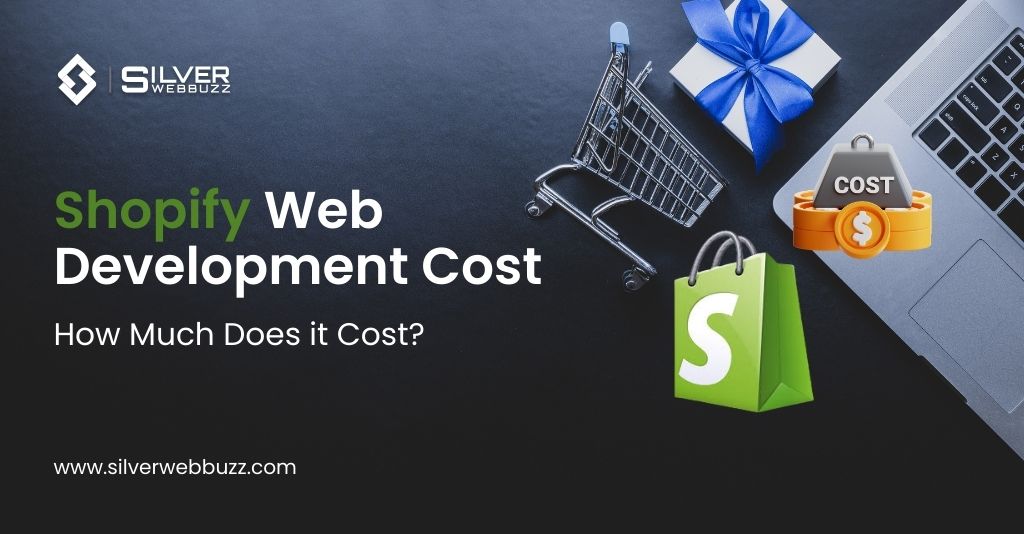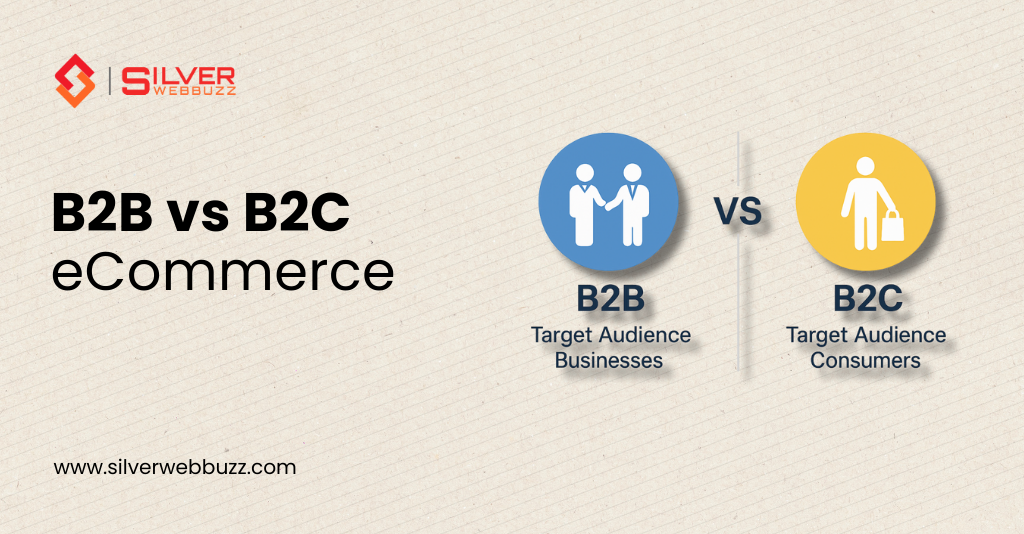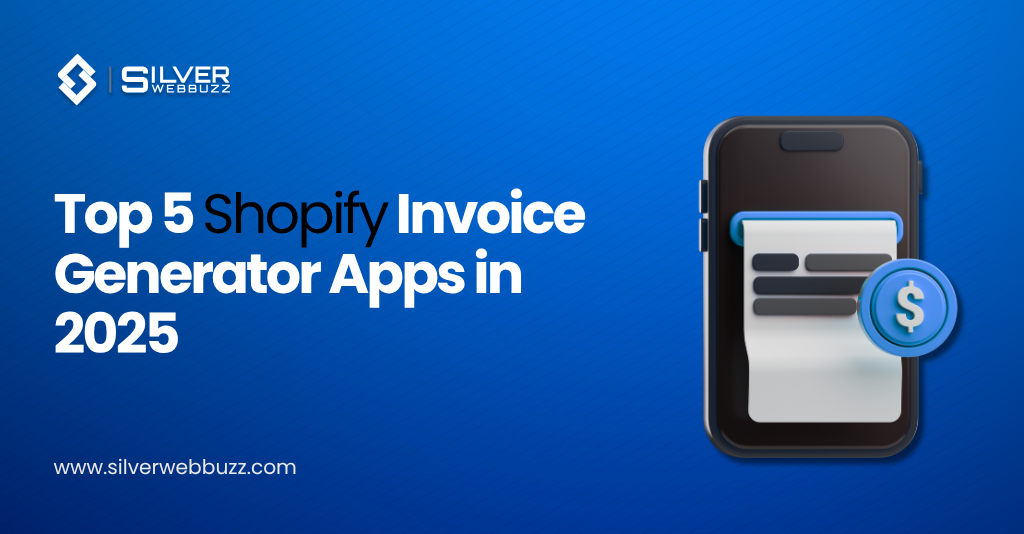Shopify has become one of the leading e-commerce platforms, empowering millions of businesses worldwide. As online stores continue to grow, merchants are constantly looking for ways to enhance their store’s functionality and improve customer experience. This is where Shopify apps play a crucial role. Developing a Shopify app allows businesses to automate processes, integrate third-party services, and provide unique features tailored to store owners’ needs. Whether you’re an entrepreneur looking to create a profitable app or a developer aiming to expand your expertise, understanding Shopify app development is essential.
In this guide, we will explore the Shopify App Development with it’s business model, benefits, key features, development process, costs, and challenges of building a Shopify app. Additionally, we’ll discuss how Silverwebbuzz can help you bring your Shopify app idea to life. Let’s dive in!
What Are Shopify Apps?
Shopify apps are third-party software solutions designed to extend the functionality of Shopify stores. They help merchants manage and optimize various business processes, such as sales, marketing, customer engagement, inventory management, and payment processing. Shopify apps can be custom-built for a specific store or made available publicly on the Shopify App Store for wider use.
Business Model of Shopify Apps
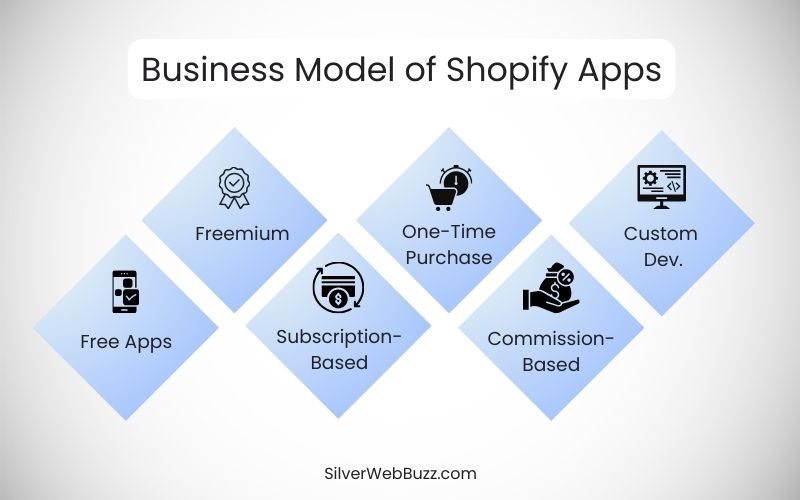
Free Apps
These apps offer basic functionality at no cost to attract users. Developers usually monetize them by offering premium upgrades, charging transaction fees, or displaying in-app advertisements.
Freemium
A hybrid model where users get access to essential features for free but must subscribe to a premium plan for advanced functionalities. This approach helps in acquiring a large user base while ensuring recurring revenue.
Subscription-Based
Apps operate on a monthly or yearly subscription model, providing consistent revenue. Merchants pay for continued access to features such as automated workflows, analytics, or AI-driven marketing tools.
One-Time Purchase
Users pay a one-time fee to unlock all features of the app permanently. While this model ensures instant revenue, it requires continuous updates and customer support to maintain value.
Commission-Based
Apps take a percentage of the sales or transactions made using their service. This model works best for apps related to payment processing, upselling, and affiliate marketing.
Custom Development
Businesses or store owners hire developers to build personalized Shopify apps tailored to their specific needs. These apps are not listed on the Shopify App Store and are used exclusively by the client.
How Do Shopify Apps Work?
Shopify apps function by integrating with the Shopify platform through APIs. After installation, the app fetches and processes store data, such as products, orders, and customer details. The app then automates tasks like inventory tracking, marketing campaigns, payment processing, and reporting. Some apps run as embedded applications within Shopify’s admin panel, while others operate as external services that communicate with the store through API calls. Depending on the app type, it can either be cloud-hosted or installed on the merchant’s system.
Why Invest in Shopify App Development?
The Shopify ecosystem is expanding rapidly, with over 4.5 million merchants relying on the platform. Developing a Shopify app allows businesses to tap into this growing market and generate revenue through subscriptions, commissions, or premium services.
Shopify apps improve operational efficiency, reduce manual work, and enhance user experience, making them a necessity for store owners. Additionally, Shopify’s App Store provides a ready-made marketplace where developers can showcase and monetize their apps. With the rising trend of e-commerce automation, investing in a Shopify app offers high ROI and long-term business growth.
Benefits of Shopify App Development
Increased Business Efficiency
Shopify apps streamline store operations by automating key tasks like order processing, inventory management, and customer engagement. This reduces manual workload, minimizes errors, and allows merchants to focus on business growth.
Enhanced User Experience
A well-optimized Shopify app improves store functionality, offering intuitive navigation and seamless performance. By simplifying complex processes, it enhances customer satisfaction and boosts conversion rates.
Revenue Generation
Shopify app developers can monetize their apps through various models, such as subscriptions, freemium plans, or commission-based earnings. This creates multiple income streams while providing value to merchants.
Global Reach
Shopify apps are accessible to merchants worldwide, enabling developers to target a vast e-commerce market. With multi-language and multi-currency support, apps can cater to different regions, increasing adoption and profitability.
Third-Party Integrations
Shopify apps seamlessly integrate with various tools like payment gateways, shipping providers, CRM systems, and marketing platforms. These integrations help store owners optimize their workflows and improve overall efficiency.
Key Features of a Successful Shopify App
- User-Friendly Interface – Intuitive design for easy navigation and usability.
- Seamless Shopify API Integration – Smooth data exchange with Shopify’s backend.
- Customization Options – Allowing store owners to modify settings as per their requirements.
- Real-Time Analytics – Providing insights into sales, traffic, and customer behavior.
- Multi-Language & Multi-Currency Support – Enabling global operations.
- Automated Workflows – Reducing manual intervention in tasks like order tracking and email marketing.
- Secure Payment Integration – Ensuring safe transactions and fraud protection.
- 24/7 Support – Offering assistance to merchants for troubleshooting issues.
Tech Stack for Shopify App Development
A robust tech stack ensures security, performance, and scalability.
Frontend Technologies
- React.js / Next.js – For building dynamic user interfaces.
- Vue.js – Lightweight and high-performing framework.
- HTML5, CSS3, JavaScript – Core web technologies for design and interactivity.
Backend Technologies
- Node.js + Express.js – Popular for scalable server-side development.
- Ruby on Rails – Native to Shopify, providing strong support for app development.
- Python (Django/Flask) – Used for AI-driven and data-heavy applications.
Database
- MongoDB – NoSQL database for flexible data storage.
- PostgreSQL – Structured database with high security.
- Firebase – Real-time database ideal for cloud-based apps.
Shopify API & SDKs
- Shopify GraphQL API / REST API – For fetching and managing store data.
- Shopify Polaris – UI components for a seamless design experience.
- Shopify App Bridge – Embedding apps directly into Shopify’s admin panel.
Hosting & Deployment
- AWS, Google Cloud – Reliable cloud hosting for scalability.
- Heroku – Easy deployment with auto-scaling capabilities.
Security & Compliance
- OAuth 2.0 – Secure authentication mechanism.
- SSL Encryption – Protecting data transmission.
- GDPR & PCI Compliance – Meeting global security standards.
The Process of Developing a Shopify App
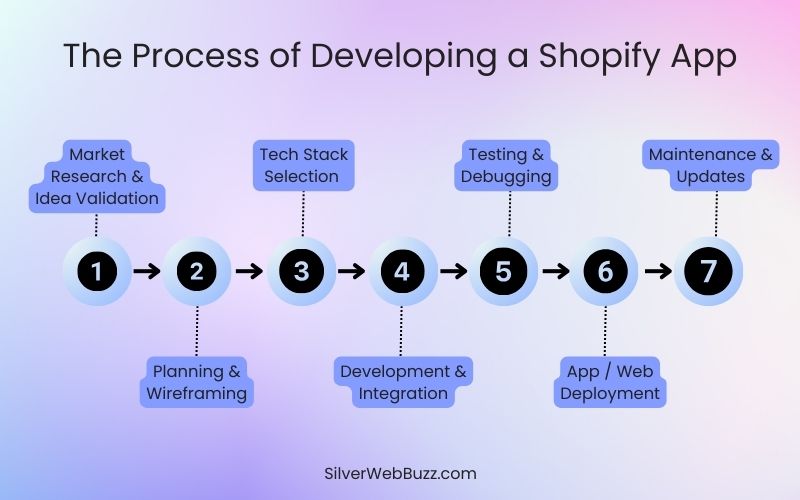
Market Research & Idea Validation
Conducting in-depth research to understand store owners’ pain points, market demand, and competitor strategies. This step helps in identifying unique selling points and ensuring the app provides real value to merchants.
Planning & Wireframing
Defining the app’s structure, user interface, and core functionalities through wireframes and prototypes. This phase ensures a well-organized workflow and a seamless user experience before development begins.
Tech Stack Selection
Choosing the right programming languages, frameworks, and databases based on app complexity and scalability needs. Selecting the ideal tech stack ensures high performance, security, and smooth integration with Shopify.
Development & Integration
Writing clean, efficient code while integrating Shopify APIs for seamless data exchange. This phase includes front-end and back-end development, ensuring all features work as expected and meet Shopify’s standards.
Testing & Debugging
Conducting rigorous testing, including functional, performance, and security tests, to identify and fix bugs. This step ensures that the app runs smoothly, providing an error-free experience for merchants.
App Deployment
Publishing the app on the Shopify App Store or integrating it privately for specific merchants. Proper documentation, compliance with Shopify’s guidelines, and marketing strategies help in a successful launch.
Maintenance & Updates
Regular updates to fix bugs, improve performance, and introduce new features based on merchant feedback. Ongoing support and security patches ensure long-term app reliability and merchant satisfaction.
Cost of Developing a Shopify App
The cost of developing a Shopify app depends on multiple factors such as complexity, features, development hours, and third-party integrations.
A basic app with limited features may cost between $5,000 – $15,000, while a mid-range app with automation and analytics features can range from $15,000 – $40,000. Advanced apps with AI-driven functionalities, extensive integrations, and high scalability may exceed $40,000 and go up to $100,000 or more.
Ongoing maintenance, updates, and customer support add to the overall cost, making it essential to plan a budget accordingly.
The Challenges of Building a Shopify App
Strict Shopify Guidelines
Shopify has a strict set of rules and policies that developers must adhere to when building apps. These guidelines are frequently updated, making it essential to stay compliant to avoid app rejection or removal from the Shopify App Store.
API Rate Limits
Shopify enforces limits on API requests, restricting how often an app can communicate with the platform. Developers must optimize API calls efficiently to prevent throttling, ensuring seamless performance without exceeding Shopify’s limits.
Security & Data Privacy
Handling sensitive merchant and customer data requires stringent security measures. Developers must implement encryption, secure authentication (OAuth 2.0), and adhere to data protection regulations like GDPR and PCI compliance to prevent breaches.
Performance Optimization
Shopify apps must be fast, responsive, and scalable to handle high traffic and large volumes of data. Poorly optimized apps can slow down a merchant’s store, negatively affecting user experience and conversions.
Third-Party Integration Complexity
Many Shopify apps need to integrate with multiple third-party services like payment gateways, CRM tools, and marketing platforms. Ensuring smooth communication between different APIs without conflicts or data loss is a major challenge.
How Silver WebBuzz Can Help?
Silverwebbuzz specializes in developing Shopify apps that enhance store performance and user experience. With a team of expert developers, they provide custom Shopify app development, seamless API integration, and scalable solutions tailored to business needs.
Whether it’s a public Shopify app for multiple store owners or a private app designed for specific functionalities, Silverwebbuzz ensures a smooth development process.
Their services include market research, UI/UX design, feature-rich development, testing, deployment, and ongoing support to keep the app up-to-date.
By leveraging modern technologies and industry best practices, Silverwebbuzz helps businesses build powerful, revenue-generating Shopify apps that stand out in the competitive e-commerce landscape.
Conclusion
Shopify app development is a lucrative opportunity for businesses looking to capitalize on the growing e-commerce industry. A well-developed app can significantly improve store management, enhance user experience, and generate substantial revenue.
Whether you’re planning to develop a custom Shopify app for your store or a public app for other merchants, partnering with an experienced development agency like Silverwebbuzz ensures success. Contact Silver webbuzz today to bring your Shopify app idea to life!


